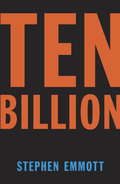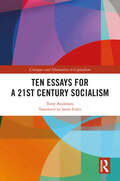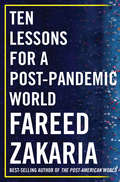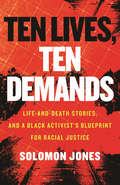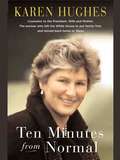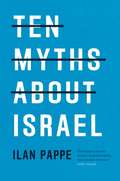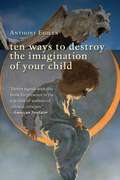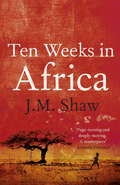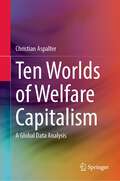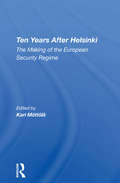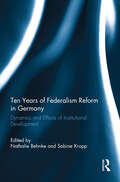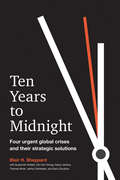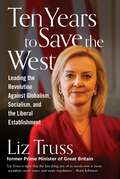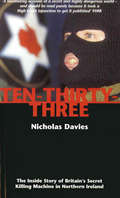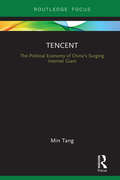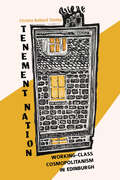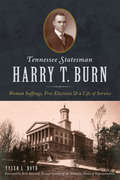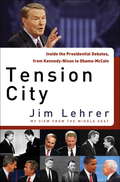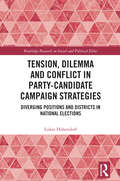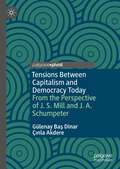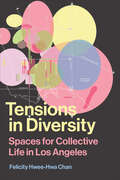- Table View
- List View
Ten Billion
by Stephen EmmottA VINTAGE ORIGINALJust over two hundred years ago, there were one billion humans on Earth.There are now over seven billion of us.And, sometime this century, the world population will reach at least ten billion.Deforestation. Desertification. Species extinction. Global warming. Growing threats to food and water. The driving issues of our times are the result of one huge problem: Us. As the population continues to grow, our problems will increase. And this means that every way we look at it, a planet of ten billion people is likely to be a nightmare. Stephen Emmott, a scientist whose lab is at the forefront of research into complex natural systems, sounds the alarm. TEN BILLION is a snapshot of our planet, and our species, approaching a crisis, and a stark analysis of where this leaves us. TEN BILLION is not another climate book. TEN BILLION is a book about us.From the Trade Paperback edition.thing but a "green" book. And it's not another book about the climate. TEN BILLION is a book about us.From the Trade Paperback edition.
Ten Essays for a 21st Century Socialism (Critiques and Alternatives to Capitalism)
by Tony AndréaniThis book explores possible and realistic alternatives to a capitalism that is no longer sustainable, whether economically, socially, or for a habitable planet. Arguing that these alternatives can only be of socialist orientation, the author moves from a discussion of works that attempted to explain the failure of the socialisms of the 20th century, to a consideration of models for a new socialism.Through consideration of issues including the role of public services, the functions of public enterprises, the creation of a socialized sector, planning, and different forms of democracy, this volume espouses a model of economic democracy capable of dealing with market mechanisms without being dominated by them, as new world geopolitics emerge.A synthesis of proposals for socialist alternatives to today’s hegemonic form of shareholder capitalism, Ten Essays for a 21st Century Socialism will appeal to scholars of sociology, political theory and economics with interests in contemporary socialism.
Ten Lessons for a Post-Pandemic World
by Fareed ZakariaCOVID-19 is speeding up history, but how? What is the shape of the world to come? <P><P> Lenin once said, "There are decades when nothing happens and weeks when decades happen." This is one of those times when history has sped up. CNN host and best-selling author Fareed Zakaria helps readers to understand the nature of a post-pandemic world: the political, social, technological, and economic consequences that may take years to unfold. Written in the form of ten "lessons," covering topics from natural and biological risks to the rise of "digital life" to an emerging bipolar world order, Zakaria helps readers to begin thinking beyond the immediate effects of COVID-19. Ten Lessons for a Post-Pandemic World speaks to past, present, and future, and, while urgent and timely, is sure to become an enduring reflection on life in the early twenty-first century. <P><P><b>A New York Times Bestseller</b>
Ten Lives, Ten Demands: Life-and-Death Stories, and a Black Activist's Blueprint for Racial Justice
by Solomon JonesTold through the powerful stories of Black lives that were ravaged by racism, this manifesto holds 10 demands to rectify racial injusticeTold through his perspective as an activist, acclaimed commentator Solomon Jones tells the stories of real people whose lives and deaths pushed the Black Lives Matter movement forward. He explains how each act of violence was incited by specific instances of structural racism, and details concrete and actionable strategies to address crimes committed by our &“justice&” system. These stories and strategies are a critical resource for social justice activists looking to further their anti-racist education. These 10 demands form an actionable plan that is necessary to repair our racist past, change the racist present, and bring justice to the future: 1. George Floyd: Pay financial reparations to Black communities that have been damaged by legalized racism. 2. Michael Brown: Use consent decrees to reform police departments that demonstrate a &“pattern or practice&” of racism and police brutality. 3. Hassan Bennett: Offer compensation for all those who are wrongfully imprisoned. 4. Breonna Taylor: Require functioning body cameras and ban no-knock warrants. 5. Eric Garner: All police disciplinary and dismissal records must be made public. 6. Alton Sterling: Change federal law to allow prosecution of flagrant lawbreakers within police departments. 7. Tamir Rice: Use independent prosecutors to eliminate prosecutorial conflicts of interest. 8. Trayvon Martin: Eliminate stand-your-ground laws. 9. Deborah Danner: Defund the police and move funds to trained social workers, mental health professionals, and conflict resolution specialists. 10. Sandra Bland: End racial profiling.
Ten Men Dead: The Story of the 1981 Irish Hunger Strike
by David BeresfordStory of the 1981 hunger strike by Irish prisoners in Northern Irelan, and the first and famous death of Bobby Sands. Uses "coms" passed secretly between the prisoners and IRA contacts outside.
Ten Minutes From Normal
by Karen Hughes"The rule of thumb in any White House is that nobody is indispensable except the president," said The New York Times, "but Karen Hughes has come as close to that description as any recent presidential aide. " Karen Hughes has worked beside President George W. Bush since, as she says, "the motorcade was only one car and he was sometimes the one driving it. " As counselor to the president, she brought the working mom's perspective to the White House, often asking of President Bush's policies, "What does this mean for the average person?"Yet the move from Texas to Washington was hard on her family, and in a controversial, headline-making decision that reverberated across America, she chose to place family first and quit the nation's capital to return to Austin. There, Hughes continues to advise the president, where the kitchen wall calendar marks the State of the Union message side by side with her son's orthodontist appointments. In this disarmingly down-to-earth, warm, often funny, and frank book, Hughes looks at her unique career in George W. Bush's inner circle and the universal concerns of balancing work and family. Ten Minutes from Normal-the title comes from the campaign trail--is a remarkable blend of the story of a "normal" woman who rose to great heights and an insightful look at American politics and America's forty-third president. This is a book for the legions of women and men everywhere who are seeking new inspiration for how to remember their priorities and achieve balance in their lives. Most important, in a post-9/11 world, Hughes redefines the very notion of what is "normal" as something special and precious, never to be taken for granted in America again.
Ten Myths About Israel
by Ilan PappeThe myths and reality behind the state of Israel and the Israeli-Palestinian conflict—from &“the most eloquent writer on Palestinian history&” (New Statesman)The outspoken and radical Israeli historian Ilan Pappe examines the most contested ideas concerning the origins and identity of the contemporary state of Israel. The &“ten myths&”—repeated endlessly in the media, enforced by the military, and accepted without question by the world&’s governments—reinforce the regional status quo and include: • Palestine was an empty land at the time of the Balfour Declaration. • The Jews were a people without a land. • There is no difference between Zionism and Judaism. • Zionism is not a colonial project of occupation. • The Palestinians left their Homeland voluntarily in 1948. • The June 1967 War was a war of &‘No Choice&’. • Israel is the only Democracy in the Middle East. • The Oslo Mythologies • The Gaza Mythologies • The Two-State Solution For students, activists, and anyone interested in better understanding the news, Ten Myths About Israel is another groundbreaking study of the Israel-Palestine conflict from the author of The Ethnic Cleansing of Palestine.
Ten Ways to Destroy the Imagination of Your Child
by Anthony EsolenPlay dates, soccer practice, day care, political correctness, drudgery without facts, television, video games, constant supervision, endless distractions: these and other insidious trends in child rearing and education are now the hallmarks of childhood. As author Anthony Esolen demonstrates in this elegantly written, often wickedly funny book, almost everything we are doing to children now constricts their imaginations, usually to serve the ulterior motives of the constrictors. Ten Ways to Destroy the Imagination of Your Child takes square aim at these accelerating trends, in a bitingly witty style reminiscent of C. S. Lewis, while offering parents—and children—hopeful alternatives. Esolen shows how imagination is snuffed out at practically every turn: in the rearing of children almost exclusively indoors; in the flattening of love to sex education, and sex education to prurience and hygiene; in the loss of traditional childhood games; in the refusal to allow children to organize themselves into teams; in the effacing of the glorious differences between the sexes; in the dismissal of the power of memory, which creates the worst of all possible worlds in school—drudgery without even the merit of imparting facts; in the strict separation of the child&’s world from the adult&’s; and in the denial of the transcendent, which places a low ceiling on the child&’s developing spirit and mind. But Esolen doesn&’t stop at pointing out the problem; he offers clear solutions as well. With charming stories from his own boyhood and an assist from the master authors and thinkers of the Western tradition, Ten Ways to Destroy the Imagination of Your Child is a welcome respite from the overwhelming banality of contemporary culture. Interwoven throughout this indispensable guide to child rearing is a rich tapestry of the literature, music, art, and thought that once enriched the lives of American children. Ten Ways to Destroy the Imagination of Your Child confronts contemporary trends in parenting and schooling by reclaiming lost traditions. This practical, insightful book is essential reading for any parent who cares about the paltry thing that childhood has become, and who wants to give a child something beyond the dull drone of today&’s culture.
Ten Weeks in Africa
by J M ShawAs Ed and Sarah Caine's plane passes over the Ngozi hills and begins its descent into Kisuru, Sarah is dazzled by the purity of unspoiled nature, the perfect environment in which to raise their son. Ed, meanwhile, as Director of the Global Justice Alliance for East Africa, looks forward to rolling up his sleeves and making a real difference in a country that seems to be developing fast. Below them, in the sprawling Makera slum, Stephen Odinga - who has to find a way of making more money for his dying mother than they can earn through the family business selling fried bananas - decides to try a more lucrative line of business. Meanwhile, Joseph Getonga, a senior official in a government that for five years has been failing to deliver on its promise to end political corruption, is feeling isolated and exposed, while others around him covertly seek personal advantage out of International Aid programmes. And beyond the hills, a rebel army seethes and waits, poised to tip the country into civil war. Before he knows it, the duplicity Ed thinks he has left behind in England will begin to infect his own family. Complicity explores, in urgent, breathtaking prose, the tensions between our ideals and our reality, the deep rifts of cultural misunderstanding and the true cost of uninformed good intentions.
Ten Worlds of Welfare Capitalism: A Global Data Analysis
by Christian AspalterThis book presents a new step farther into the twenty-first century, for the first time truly combining a comprehensive global data analysis with social policy theory development. The theory of global ideal-typical welfare regimes, also known as the “Ten Worlds of Welfare Regime Theory”, as set forth earlier by Christian Aspalter, is now in this book tested empirically using a quantitative global data analysis for the first time. The strong and rich results fully vindicated the Ten Worlds Theory. All in all, about 150 countries are included in this test, measuring numerous variables on two main dimensions, i.e., povertization and inequality. The innovative approach of using a new indicator, Aspalter’s Standardized Relative Performance Index, is applied, which facilitated the exact measurements of distances between relative performances of each variable, each dimension, each country, and each ideal-typical welfare regime (in relation to one another, respectively). In addition, one explanative and one normative meta-study is added to the book, to point to ways to understand and deal with the global culprit of inequality and, hence, poverty.“On the backdrop of decades of comparative theoretical and empirical research we now, for the first time, have a truly global analysis of welfare regimes.” ---- Peter Abrahamson, Department of Sociology, University of Copenhagen
Ten Years After Helsinki: The Making Of The European Security Regime
by Kari Mottola Klaus Krokfors Lars B Wallin Adam Daniel RotfeldDivided between two military alliances, Europe has maintained stability based on political status quo and military power balance. However, European states—including neutral and nonaligned countries—have felt a need for a common policy to guarantee their security, and the Conference on Security and Cooperation in Europe (CSCE) was convened to address this concern. Ten years later, the authors of this study find that the outlines of a European security regime are indeed discernible. The conference in Helsinki initiated efforts for negotiated and controlled change in Europe. Contributors to this volume analyze the achievements of CSCE, consider more recent models of collective or common security systems, and deal with political and military processes at work in Europe as well as relationships with great powers and the Third World. The role of Western Europe, and particularly Finland's role as an initiator of the CSCE process, receives special attention. Documentation of the tenth anniversary meeting and the CSCE process in general are also included.
Ten Years of Federalism Reform in Germany: Dynamics and Effects of Institutional Development
by Sabine Kropp Nathalie BehnkeThis book investigates the politics of federalism reform in Germany which has spanned over more than a decade. Different from reform attempts in other federal countries, the German reform was split up in three distinct steps: an adjustment of legislative powers between the federal and the state level, followed by the introduction of the ‘debt brake’; and, finally, the reform of fiscal equalization. Against the background of this sequential reform, this book not only discusses the effects of single reform steps, but also examines the results and inconsistencies of the overall reform process and reconsiders its cumulated effects. The contributions collected in this volume cover a broad range of reform aspects, among them historical aspects, the role of party politics, changes in the legislative process, and the resurgence of joint decision-making. All chapters contribute to the theoretical framework which sheds a fresh view on the dynamics of federalism reforms. The chapters originally published in a special issue of Regional and Federal Studies.
Ten Years to Midnight: Four Urgent Global Crises and Their Strategic Solutions
by Blair H. Sheppard"Shows how humans have brought us to the brink and how humanity can find solutions. I urge people to read with humility and the daring to act."—Harpal Singh, former Chair, Save the Children, India, and former Vice Chair, Save the Children InternationalIn conversations with people all over the world, from government officials and business leaders to taxi drivers and schoolteachers, Blair Sheppard, global leader for strategy and leadership at PwC, discovered they all had surprisingly similar concerns. In this prescient and pragmatic book, he and his team sum up these concerns in what they call the ADAPT framework: Asymmetry of wealth; Disruption wrought by the unexpected and often problematic consequences of technology; Age disparities--stresses caused by very young or very old populations in developed and emerging countries; Polarization as a symptom of the breakdown in global and national consensus; and loss of Trust in the institutions that underpin and stabilize society. These concerns are in turn precipitating four crises: a crisis of prosperity, a crisis of technology, a crisis of institutional legitimacy, and a crisis of leadership.Sheppard and his team analyze the complex roots of these crises--but they also offer solutions, albeit often seemingly counterintuitive ones. For example, in an era of globalization, we need to place a much greater emphasis on developing self-sustaining local economies. And as technology permeates our lives, we need computer scientists and engineers conversant with sociology and psychology and poets who can code. The authors argue persuasively that we have only a decade to make headway on these problems. But if we tackle them now, thoughtfully, imaginatively, creatively, and energetically, in ten years we could be looking at a dawn instead of darkness.
Ten Years to Save the West
by Liz TrussCan the West Be Saved? Liz Truss, the former Conservative prime minister of Great Britain, thinks that&’s an open question.During her ten years at the highest levels of the British government, she often found that she was the only conservative in the room. She witnessed, first-hand, the machinations of globalists who would like nothing more than to impose corporate state-socialism on the world. Freedom is at risk, she warns, and the Conservative Party in Britain—and the Republican Party in the United States—are ill-equipped to defend it. The problem? Conservatives have accepted too many of the left&’s taking points, allowed the left to set the political agenda, and capitulated endlessly whenever the left has sought to impose bigger government and curtail individual freedoms. The dictatorial excesses during the Covid-19 lockdowns should have been a stark warning because they are a precursor of things to come if conservatives continue to waffle on principle, surrender on policy, and fail with the electorate. In Ten Years to Save the West, Liz Truss reveals:Why socialism—despite its endless record of failure—remains popular, both with global elites and with the next generationThe clear and present danger of the ever-expanding &“administrative state&”How conservative parties are complicit in policies of &“managed decline&”Why we cannot ignore the threat of an aggressive ChinaWhy Ronald Reagan and Margaret Thatcher should remain the guiding lights for conservatives on both sides of the AtlanticUrgent, detailed, and full of insights gleaned from the highest levels of politics, Liz Truss&’s warning to the West cannot be ignored.
Ten-Thirty-Three: The Inside Story of Britain's Secret Killing Machine in Northern Ireland
by Nicholas DaviesThis explosive book reveals the conspiracy between British Military Intelligence and the gunman of the UDA who targeted and killed both Republican terrorists and ordinary Catholics. The secret partnership was sanctioned at the highest level of the British government and full details of planned operations, including killings, were passed directly to its Joint Intelligence Committee in London. Ten-Thirty-Three was the codename given to the agent who was fed with all the details necessary for Loyalist gunmen to carry out their murderous activities. But somewhere along the line the power went to Ten-Thirty-Three’s head and he became increasingly unpredictable. It wasn’t long before he was completely out of control, and his Military Intelligence bosses had the makings of a major catastrophe on their hands… This extraordinary true story lifts the lid on shocking abuses of power in Belfast in the 1980s and 1990s.
Tenants of the House
by Wale OkediranTenants of the House is a skillful depiction of the ugly underbelly of Nigerian politics unveiling the intrigues, chicanery, and greed pervasive within the country s political and legislative processes. The book is a fictionalized account of the author s experiences while serving in the country s House of Representatives. It portrays with gripping suspense a nation in dire need of moral rejuvenation.
Tenants: The People on the Frontline of Britain's Housing Emergency
by Vicky SprattONE OF THE BEST BOOKS OF 2022, METRO, EVENING STANDARD, REFINERY29, COSMOPOLITAN'A must-read' Cosmopolitan'A major new book on the history and politics of renting' Evening Standard'There is nobody better placed to write a book that tells the stories of "Britain's housing shame"' MetroTony is facing eviction instead of enjoying retirement; Limarra isn't 'homeless enough' to get help from the council; and for Kelly and her asthmatic son Morgan, another new rented house is a matter of life and death. This is twenty-first century Britain, where millions are forced into the private rental sector - a sector that creates profit for landlords, not safe and stable homes for tenants.In this fierce and moving account, journalist Vicky Spratt traces decades of bad policy decisions to show how and why the British dream of homeownership has withered and the safety net of social housing has broken. Through the lives of those in the renting trap, she illuminates the ways this crisis is devastating our health, communities and political landscape. But, as the Covid epidemic showed, there are also real, radical steps we can take to give everyone the chance of a good home.
Tencent: The Political Economy of China’s Surging Internet Giant (Global Media Giants)
by Min TangIn this book, author Min Tang examines the political economy of the China-based leading global Internet giant, Tencent. Tracing the historical context and shaping forces, the book illuminates Tencent’s emergence as a joint creation of the Chinese state and transnational financial capital. Tencent reveals interweaving axes of power on different levels, particularly interactions between the global digital industry and contemporary China. The expansion strategies Tencent has employed—horizontal and vertical integration, diversification and transnationalization—speak to the intrinsic trends of capitalist reproduction and the consistent features of the political economy of communications. The book also pinpoints two emerging and entangling trends— transnationalization and financialization—as unfolding trajectories of the global political economy. Understanding Tencent’s dynamics of growth helps to clarify the complex nature of China’s contemporary transformation and the multifaceted characteristics of its increasingly globalized Internet industry. This short and highly topical research volume is perfect for students and scholars of of global media, political economy, and Chinese business, media and communication, and society.
Tender Mercies: Inside the World of a Child Abuse Investigator
by Keith N. RichardsThis first-person, emotional account of a child protective services worker in New York State gives the reader an intimate look at all aspects of handling child abuse cases: interviewing parents, talking to abused children removed from their parents' care, and keeping up with the mounds of paperwork each case generates. Tender Mercies is a must-read for professionals and laypeople alike!
Tenement Nation: Working-Class Cosmopolitanism in Edinburgh (Framing the Global)
by Christa Ballard TooleyAround the world, blue-collar politics have become associated with resistance to the multicultural. While this may also be true in Edinburgh, Scotland, a closer look reveals the growth of liberal democratic ideals in the working-class population, which has a much different goal: How can this European city keep the entrepreneurial forces of globalization from commodifying what is distinctly theirs?In Tenement Nation, Christa Ballard Tooley explores the battle for a neighborhood called the Canongate in Edinburgh's Old Town. Tooley's insightful study of the working-class Canongate community as they negotiate gentrification plans offers a complex view of class and nation. The threat of the Canongate's redevelopment motivated many throughout Edinburgh to lend their support to the residents' campaign. Against such development projects, alliances formed between upper-class heritage supporters and working-class urban residents, all of whom turned to institutions such as the European Union and UNESCO for support in restricting commercial development. Tenement Nation explores these negotiations between socioeconomic classes and even nationalities to show what Tooley calls a "working-class cosmopolitanism" in pursuit of social, economic, and political inclusion.
Tennesse Statesman Harry T. Burn: Woman Suffrage, Free Elections & a Life of Service
by Tyler BoydHarry T. Burn’s great-grandnephew chronicles the life and legacy of the Tennessee legend who helped ratify the 19th Amendment.After reading a letter from his mother, Burn cast the deciding vote to ratify the Nineteenth Amendment to the U.S. Constitution, granting suffrage rights to millions of American women. Born and raised in McMinn County, he served in Tennessee government in various capacities for many years, including terms in the state senate and as delegate to state constitutional conventions. His accomplishments include helping secure universal suffrage rights, drafting clean election laws and leading successful careers in law and banking. He encountered more controversies in his career, such as an unsuccessful gubernatorial bid, election fraud and implementation of state legislative reapportionment.“In this deeply researched biography, Tyler L. Boyd finally brings us the full man, putting into context Burn’s singular act of conscience, helping us to understand how one person can make a difference.” —Elaine Weiss, author of The Woman’s Hour: The Great Fight to Win the Vote“The story of what happened before and after Burn’s fateful vote has been told often but often told wrong. [This book] gives us the real story, one well worth remembering as we commemorate the ratification of the Nineteenth Amendment in August 1920, courtesy of the Volunteer State.” —Marjorie J. Spruill, author of Divided We Stand and One Woman, One Vote
Tension City: Inside the Presidential Debates
by Jim Lehrer"In his quiet but intense way, Jim Lehrer earns the trust of the major political players of our time," notes Barbara Walters. "He explains and exposes their hopes and dreams, their strengths and failures as they try to put their best foot forward."From the man widely hailed as "the Dean of Moderators" comes a lively and revealing book that pulls back the curtain on more than forty years of televised political debate in America. A veteran newsman who has presided over eleven presidential and vice-presidential debates, Jim Lehrer gives readers a ringside seat for some of the epic political battles of our time, shedding light on all of the critical turning points and rhetorical faux pas that helped determine the outcome of America's presidential elections--and with them the course of history. Drawing on his own experiences as "the man in the middle seat," in-depth interviews with the candidates and his fellow moderators, and transcripts of key exchanges, Lehrer isolates and illuminates what he calls the "Major Moments" and "killer questions" that defined the debates, from Kennedy-Nixon to Obama-McCain.Oftentimes these moments involve the candidates themselves and are seared into our collective political memory. Michael Dukakis stumbles badly over a question about the death penalty. Dan Quayle compares himself to John F. Kennedy once too often. Barack Obama and John McCain barely make eye contact over the course of a ninety-minute discussion. At other times, the debate moderators themselves become part of the story--and Lehrer is there to give us a backstage look at the drama. Peter Jennings suggests surprising the candidates by suspending the carefully negotiated rules minutes before the 1988 presidential debate--to the consternation of his fellow panelists. Lehrer himself weathers a firestorm of criticism over his performance as moderator of the 2000 Bush-Gore debate. And then there are the excruciating moments when audio lines go dead and TelePrompTers stay dark just seconds before going on the air live in front of a worldwide television audience of millions.Asked to sum up his experience as a participant in high-level televised debates, President George H. W. Bush memorably likened them to an evening in "tension city." In Jim Lehrer's absorbing insider account, we find out that truer words were never spoken.
Tension, Dilemma and Conflict in Party-Candidate Campaign Strategies: Diverging Positions and Districts in National Elections (Routledge Research on Social and Political Elites)
by Lukas HohendorfThis book examines the campaign communication of political candidates in parliamentary democracies, set within the broader trends of globalization and political personalization.It explores how district candidates balance local voter preferences, national party demands, and personal beliefs in their campaigns. Using Germany as a case study and drawing on a wide range of data sources, the book reveals how situational factors, such as electoral rules, candidate experience, and local party organization, influence campaign strategies. It demonstrates how campaign positions in parliamentary democracies often deviate from national party stances, with implications on party unity and democratic representation. Framed by the pressing challenges of regional divergence and the rise of political personalization, the book shows why studying individual candidate behavior – rather than simply focusing on party leaders – is crucial for understanding modern democratic systems.This book will be a key resource for scholars, students, and practitioners in the fields of political parties and elites, electoral studies, political communication, and, more broadly, comparative politics.
Tensions Between Capitalism and Democracy Today From the Perspective of J. S. Mill and J. A. Schumpeter
by Çınla Akdere Gülenay Baş DinarThis book examines the intellectual ideas that underpin our understanding of capitalism. Framing these debates through the work on John Stuart Mill and Joseph Schumpeter, the development of democracy and its relationship with capitalism is explored to provide insight into the rationality of individuals and the distribution of power. By analysing the evolution of economic systems, ideas relating to democracy, capitalism, liberalism, competition, and elites are also defined.This book aims to inform current economic and political debates and to highlight new forms of democracy and capitalism. It will be relevant to students and researchers interested in the political economy and the history of economic thought.
Tensions in Diversity: Spaces for Collective Life in Los Angeles
by Felicity Hwee-Hwa ChanUrban landscapes are complex spaces of sociocultural diversity, characterized by narratives of both conviviality and conflict. As people with multiple ethnicities and nationalities find their common destinies in thriving globalizing cities, social cohesiveness becomes more precarious as different beliefs, practices, ambitions, values, and affiliations intersect in close proximity, producing social tensions. Tensions in Diversity presents a multi-method comparative study that draws on the experiences of 140 residents of native and immigrant origin, community organizers, and municipal officers in three culturally diverse neighbourhoods of varying income levels in Los Angeles County. Using cognitive mapping analysis combined with data from interviews, surveys, and participant observation, this book explores how exactly coexistence is socio-spatially experienced and negotiated in daily life. Tensions in Diversity identifies the planning and design considerations that enable intercultural learning in the public places within diverse cities. In doing so, this book foregrounds urban space as an active force in shaping coexistence and convivial public environments.
